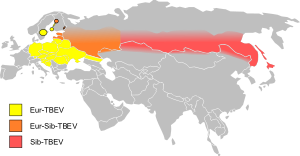
Tick-borne encephalitis

Tick-borne encephalitis (TBE) is a viral infectious disease involving the central nervous system. The disease most often manifests as meningitis, encephalitis, or meningoencephalitis. Long-lasting or permanent neuropsychiatric consequences are observed in 10 to 20% of infected patients. Tick-borne encephalitis (TBE) is a viral infectious disease involving the central nervous system. The disease most often manifests as meningitis, encephalitis, or meningoencephalitis. Long-lasting or permanent neuropsychiatric consequences are observed in 10 to 20% of infected patients. The number of reported cases has been increasing in most countries. TBE is posing a concerning health challenge to Europe, as the number of reported human cases of TBE in all endemic regions of Europe have increased by almost 400% within the last three decades. The tick-borne encephalitis virus is known to infect a range of hosts including ruminants, birds, rodents, carnivores, horses, and humans. The disease can also be spread from animals to humans, with ruminants and dogs providing the principal source of infection for humans. TBE, like Lyme disease, is one of the many tick-borne diseases. The disease typically follows a biphasic pattern in 72–87% of patients and the median incubation period is 8 days (range, 4–28 days) after tick bite. Non specific symptoms of mild fever, malaise, headache, nausea, vomiting and myalgias may be present as first manifestation of the disease and spontaneously resolve within 1 week. After another week the patient may develop neurological symptoms.The virus can result in long neurological symptoms, infecting the brain (encephalitis), the meninges (meningitis) or both (meningoencephalitis).In general, mortality is 1% to 2%, with deaths occurring 5 to 7 days after the onset of neurologic signs. In dogs, the disease also manifests as a neurological disorder with signs varying from tremors to seizures and death. In ruminants, neurological disease is also present, and animals may refuse to eat, appear lethargic, and also develop respiratory signs. TBE is caused by tick-borne encephalitis virus, a member of the genus Flavivirus in the family Flaviviridae. It was first isolated in 1937. Three virus sub-types also exist: European or Western tick-borne encephalitis virus (transmitted by Ixodes ricinus), Siberian tick-borne encephalitis virus (transmitted by I. persulcatus), and Far-Eastern tick-borne encephalitis virus, formerly known as Russian spring summer encephalitis virus (transmitted by I. persulcatus). Russia and Europe report about 5,000–7,000 human cases annually.
